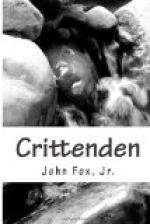The Cuban fever does not loosen its clutch easily.
Crittenden went to bed that day and lay there delirious and in serious danger for more than a fortnight. But at the end a reward came for all the ills of his past and all that could ever come.
His long fight was over, and that afternoon he lay by his window, which was open to the rich, autumn sunlight that sifted through the woods and over the pasture till it lay in golden sheens across the fence and the yard and rested on his window-sill, rich enough almost to grasp with his hand, should he reach out for it. There was a little colour in his face—he had eaten one good meal that day, and his long fight with the fever was won. He did not know that in his delirium he had spoken of Judith—Judith—Judith—and this day and that had given out fragments from which his mother could piece out the story of his love; that, at the crisis, when his mother was about to go to the girl, Judith had come of her own accord to his bedside. He did not know her, but he grew quiet at once when the girl put her hand on his forehead.
Now Crittenden was looking out on the sward, green with the curious autumn-spring that comes in that Bluegrass land: a second spring that came every year to nature, and was coming this year to him. And in his mood for field and sky was the old, dreamy mistiness of pure delight—spiritual—that he had not known for many years. It was the spirit of his youth come back—that distant youth when the world was without a shadow; when his own soul had no tarnish of evil; when passion was unconscious and pure; when his boyish reverence was the only feeling he knew toward every woman. And lying thus, as the sun sank and the shadows stole slowly across the warm bands of sunlight, and the meadow-lark called good-night from the meadows, whence the cows were coming homeward and the sheep were still browsing—out of the quiet and peace and stillness and purity and sweetness of it all came his last vision—the vision of a boy with a fresh, open face and no shadow across the mirror of his clear eyes. It looked like Basil, but it was “the little brother” of himself coming back at last—coming with a glad, welcoming smile. The little man was running swiftly across the fields toward him. He had floated lightly over the fence, and was making straight across the yard for his window; and there he rose and floated in, and with a boy’s trustfulness put his small, chubby hand in the big brother’s, and Crittenden felt the little fellow’s cheek close to his as he slept on, his lashes wet with tears.
The mother opened the door; a tall figure slipped gently in; the door was closed softly after it again, and Judith was alone; for Crittenden still lay with his eyes closed, and the girl’s face whitened with pity and flamed slowly as she slowly slipped forward and stood looking down at him. As she knelt down beside him, something that she held in her hand clanked softly against the bed and Crittenden opened his eyes.




